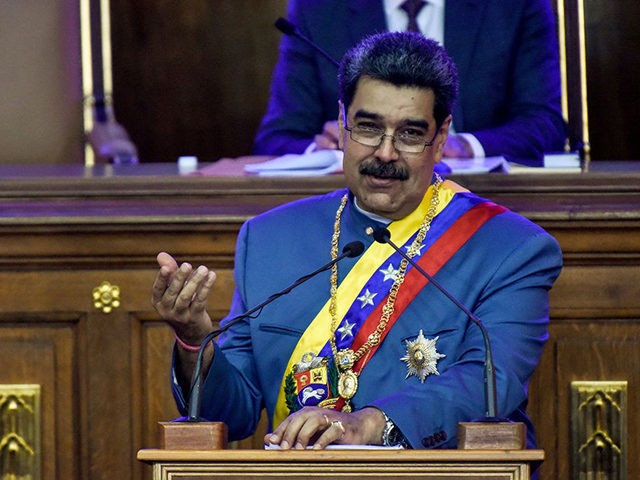Venezuelan dictator Nicolás Maduro accused Facebook founder Mark Zuckerberg of “abusive and dictatorial” behavior after Facebook censored Maduro’s promotion of an unproven coronavirus treatment known as Carvativir, an antiviral drug which Maduro refers to as “miracle drops.”
Facebook on January 31 prevented Maduro’s government from uploading videos in which Maduro discusses Carvativir’s alleged ability to treat symptoms of the Chinese coronavirus.
No studies have found the “miracle drops” have any significant impact on fighting the Chinese coronavirus and Carvativir is not in use in treating the pathogen anywhere else in the world.
“Who is in charge in Venezuela, the owner of Facebook? Who rules the world, the owner of Facebook? Zuckerberg is a tremendous abuser. The world has to reflect on the abuses of social networks. They are multimillionaire people who try to impose their truths, their reasons, their abuses on the world,” Maduro said of the tech censorship during a televised speech on February 2.
“So they [Facebook] say that until the World Health Organization (W.H.O.) says ‘yes,’ I cannot talk about Carvativir,” Maduro said, referring to Carvativir’s lack of approval for use as a Chinese coronavirus treatment by international health bodies.
Maduro stated in late January that Carvativir could “neutralize 100 percent” of Chinese coronavirus symptoms before he was forced to retract his claims after receiving criticism from health experts. He adjusted his statement on the “miracle drops” two days later, saying they served as a “complementary” treatment for the Chinese coronavirus when combined with other proven medicines.
The Pan American Health Organization (PAHO) on January 27 asked Maduro’s government to present any findings it might have on Carvativir, which was developed in Venezuela. Maduro, in a January 31 address, said his health officials would publish their findings on the drug’s efficacy “in the coming days,” but has yet to do so.
A Venezuelan scientific research institute led the first studies on Carvativir, allegedly carried out at “two private laboratories abroad,” according to Venezuela’s Minister of Science, Gabriela Jiménez. “The results (of the studies) showed that the patients showed a modulating effect with Carvativir,” Jiménez said on January 31. “The results are encouraging and the articles [containing the data] are already available.”
Earlier in January, Maduro claimed his government would soon begin “mass producing” Carvativir so that it would be easily available for the public in all medical centers in Venezuela. He also said that his government had plans to eventually export the drug to countries that, together with Venezuela, form the Bolivarian Alliance for the Peoples of Our America (ALBA). Former Venezuelan dictator Hugo Chavez founded the ALBA bloc as an alternative to the U.S.-led Free Trade Area of the Americas (FTAA). It consists of Venezuela, Cuba, Nicaragua, Bolivia, Haití, and other Caribbean nations.
Maduro first presented Carvativir to the Venezuelan public on January 24, describing the oral solution as “miracle drops of Jose Gregorio Hernandez,” a 19th-century Venezuelan doctor beatified by the Roman Catholic Church in 2020, without elaborating on the drug’s active ingredients. Maduro has previously promoted other unproven treatments for the Chinese coronavirus, including antiviral interferons, which some medical experts have warned may be deadly when used to treat coronavirus patients. Maduro claimed on January 17 that Venezuelan hospitals would adopt “rectal ozone therapy” to treat coronavirus symptoms, a method in which doctors administer ozone (O3) into a patient’s rectum. The U.S. Food and Drug Administration (U.S.F.D.A.) cautions that the amount of O3 needed to kill pathogens is greater than what may be tolerable in a human being, and has advised against the use of ozone to treat coronavirus patients or as a disinfectant.

COMMENTS
Please let us know if you're having issues with commenting.